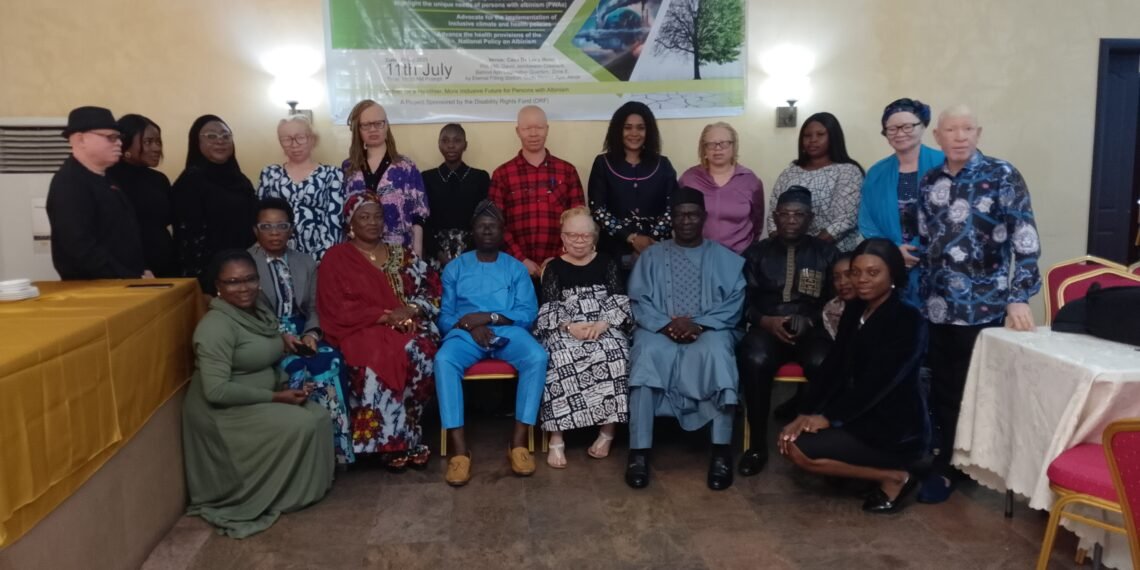A cross-section of government ministries, disability rights advocates, and civil society organizations have issued a strong call for inclusive action on climate change and health policies, particularly in response to the unique vulnerabilities of persons with albinism (PWAs). The call was made at the conclusion of a One-Day Stakeholders’ Meeting on Disability-Inclusive Climate Change and Health Policies, held at Casa De Lucy Hotel, Gudu District, Abuja, and organized by the Albinism Association of Nigeria (AAN) with funding from the Disability Rights Fund (DRF).
The meeting brought together key representatives from the Federal Ministries of Health, Environment, and Education; the National Orientation Agency (NOA); the Independent National Electoral Commission (INEC); the National Commission for Persons with Disabilities (NCPWD); the Joint National Association of Persons with Disabilities (JONAPWD); and members of the albinism community.
In a communiqué issued at the end of the meeting, participants highlighted the growing vulnerability of persons with disabilities (PWDs), especially persons with albinism (PWAs), to the harsh realities of climate change including extreme heat, environmental inaccessibility, and worsening health inequalities. They reaffirmed that existing legal frameworks such as the National Policy on Albinism, the Discrimination Against Persons with Disabilities (Prohibition) Act 2018, and the UN Convention on the Rights of Persons with Disabilities (UNCRPD) all require inclusive and equitable implementation across all sectors. The communiqué called for disability-responsive adaptation strategies to be mainstreamed into national and state climate action plans, the provision of accessible early warning systems, and the availability of sun-protective aids and climate-resilient infrastructure particularly for underserved PWA communities.
On health, stakeholders urged the Federal Ministry of Health to fully implement the provisions of the National Policy on Albinism by ensuring access to free or subsidized dermatological and ophthalmological care. The National Health Insurance Authority (NHIA) was also called upon to include specialized services for persons with albinism in its benefit packages. Expanding mobile health outreach services to rural and marginalized areas was highlighted as an essential step toward reducing inequalities in healthcare access. On inclusive education, the communiqué recommended curriculum reforms to promote awareness about albinism and the provision of low-vision assistive devices, inclusive infrastructure, and teacher training on disability awareness and inclusive methodologies.
Stakeholders further called for stronger inter-ministerial coordination between the Ministries of Health, Environment, and Education to effectively implement inclusive development programs. They urged INEC to ensure accessible electoral processes for PWAs and other PWDs and encouraged the National Orientation Agency to lead public awareness campaigns on climate and health challenges affecting persons with albinism. The meeting also stressed the importance of representation and participation, demanding that persons with albinism especially women and girls should be included in planning and decision-making spaces. They recommended that OPDs such as AAN and JONAPWD be institutionalized as key partners in government consultations.
Finally, the communiqué emphasized the need for improved data collection systems that disaggregate by disability type, age, gender, and location to support effective planning. Stakeholders committed to continuous monitoring and evaluation of climate and health programs to ensure they are inclusive and impactful.
Speaking at the meeting, Mr. Joseph Akuse, Program Manager of AAN, reaffirmed the Association’s commitment to ensuring the voices and rights of persons with albinism are at the center of Nigeria’s development agenda. “This meeting represents a collective stand against exclusion. We must all act now to make sure no one is left behind in the face of climate and health challenges,” he stated.
The event concluded with endorsements from participating agencies, including the Federal Ministries of Health, Environment, and Education; NOA; INEC; NCPWD; JONAPWD; and members of the albinism community. The Albinism Association of Nigeria expressed gratitude to the Disability Rights Fund for its continued support and reaffirmed its commitment to inclusive advocacy and policy engagement.



